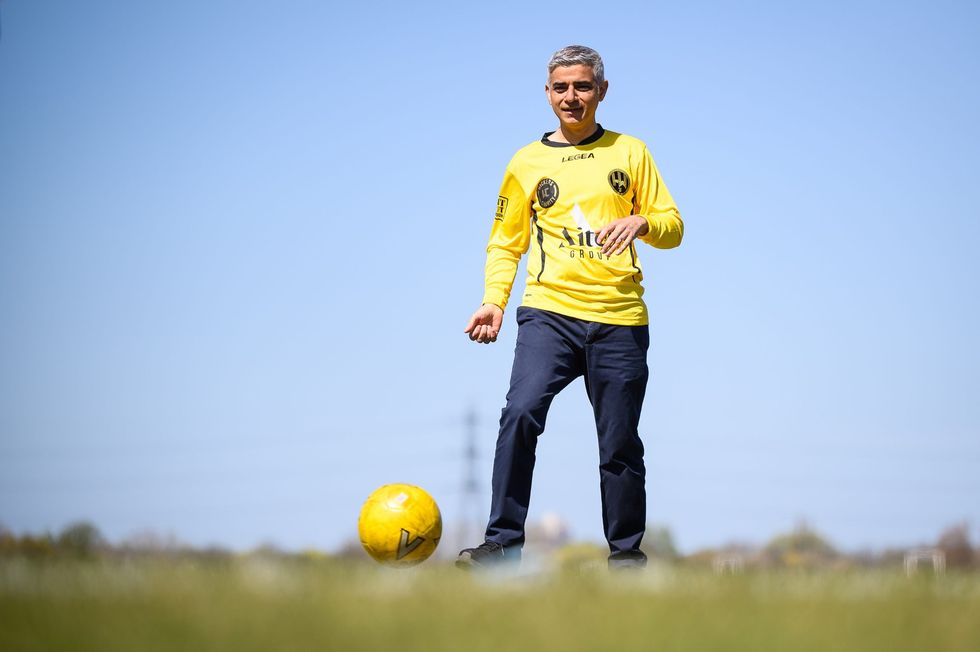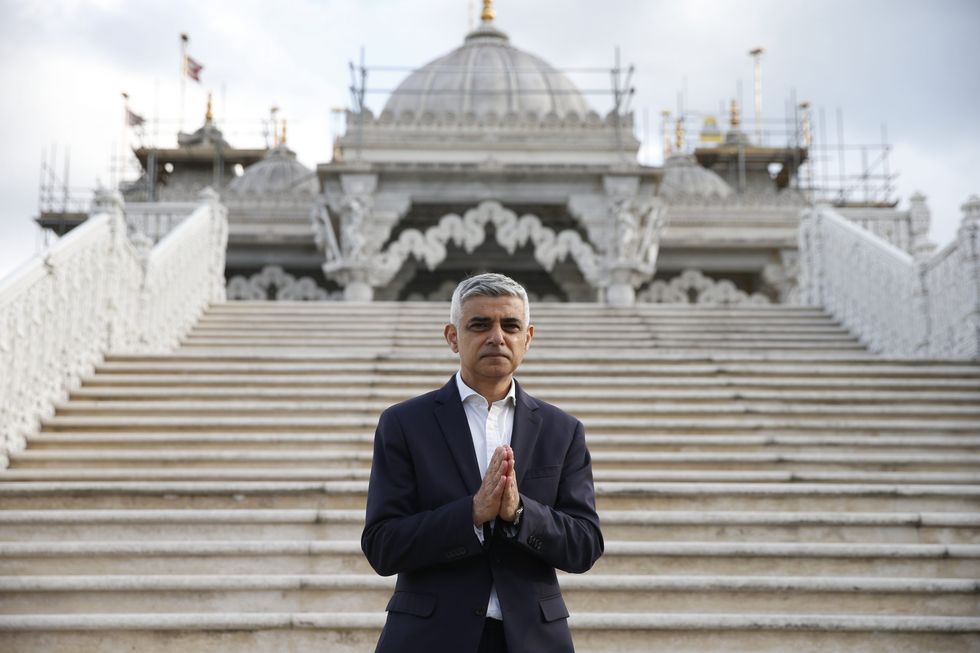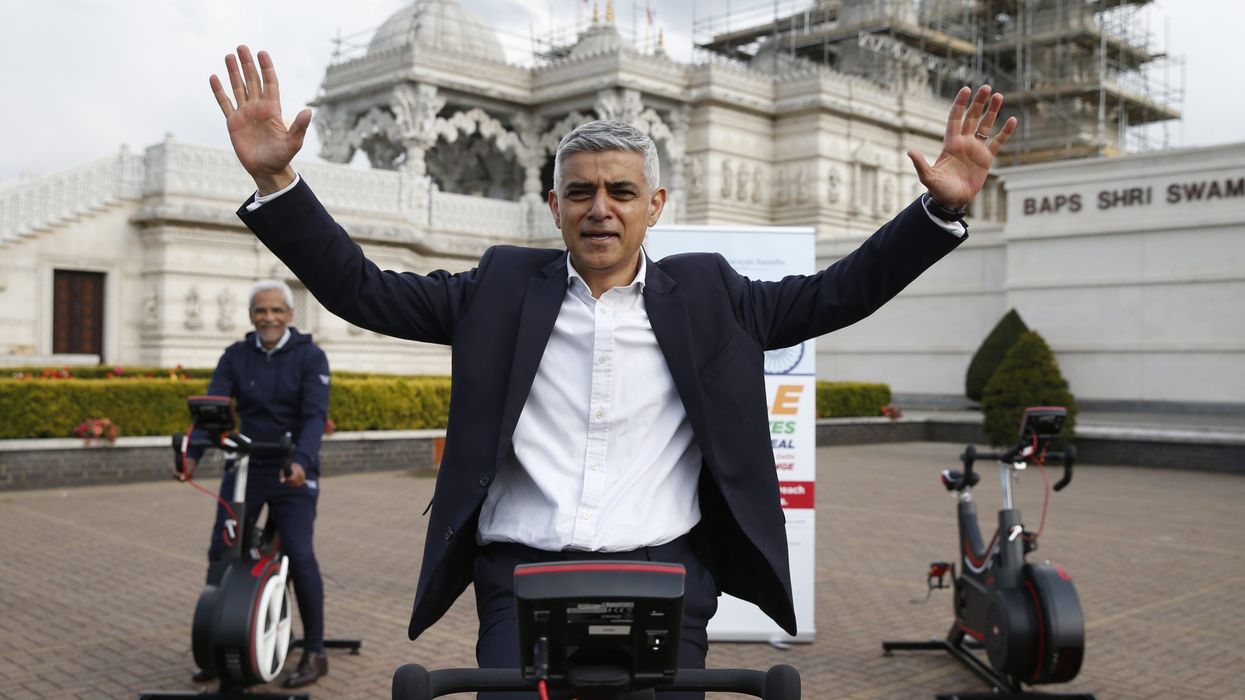Mayor reveals why he was forced to put up congestion charges in the capital
by Barnie Choudhury
London mayor, Sadiq Khan, promised to fight to make sure his city recovers from the pandemic, if he were re-elected on Thursday (6).
Europe’s first south Asian and Muslim mayor of a capital city also revealed how the British government forced him to raise congestion charges.
Khan was speaking during an "In Conversation" event organised by the Asian Media Group and Eastern Eye.
“My credibility of making promises is determined by what I've done in the past,” he told a virtual global audience of more than 54,000. “So, the good news is we've managed to successfully lobby the government to extend the business rate holiday that was going to stop, if you remember, in March.
“We successfully lobbied government to extend the VAT relief that was going to end in March. We managed to persuade them to extend the furlough scheme till September that was also going to end in March.”
And he said he wanted to continue what his administration had already started.
“Those who have been furloughed, could become redundant without proper support. Those businesses that are currently, I call them ‘incubated on life support’, may not survive when it comes to reopening.
“We are doing massive promotion campaigns to encourage people to come back to the central of London in particular. Why do I say that? Because many of these businesses rely on footfall. If you're a restaurant, if you're a hotel, you need people coming back for this early summer.”
Sport for recovery
Khan pointed out that his administration intended to plough more than £544 million in schemes such as development academies in the green, creative, digital, health and social care sectors supporting Londoners to get the skills they needed for jobs in the future.
Khan also promised to capitalise on London as a venue for sport and is advertising around the country to attract visitors.
“We set aside £6m to encourage people from the west and across the country for people to come to London safely throughout the summer,” he continued.
“We've got eight football matches taking place in London as part of the Euro 2020s. The finals are at Wembley, two semi-finals, and the group stages and the hopefully England will be supported all the way through to the final by fans in London.
“We’ve got great cricket coming to London. India are coming, Pakistan are coming, New Zealand are coming. So, these sporting events combined with that cultural events will give us, hopefully, the springboard for rapid recovery this summer, leading on to the future going forward.”

He reaffirmed his campaign promise to bring the Indian Premier League (IPL) to London.
Congestion charge
Foreign travel is expected to re-open on 17 May, but the government wants a red, amber, green traffic-light system for different countries affected by the virus.
“We want as many countries as possible to prove they're a safe country for international tourism,” said the mayor.
“For green countries they don’t need to self-isolate. For amber countries they need to self-isolate. For the for the red countries, obviously, they'll have to quarantine.
“We're going to have to be careful that we don't inadvertently, in our speed to reopen the economy, have the virus returning. So, this time, I commend the government. They've got it right on this occasion. Their roadmap is every four weeks they look at the evidence.”
Retailers and charities blamed Khan for putting up congestion charges to £15, for extending the hours and making it seven days a week, as well as widening the area.
One company said it was paying a quarter of a million pounds in fines and £300,000 in congestion charges per year while trying to deliver medical equipment to London’s hospital, GP surgeries and pharmacies.

Neasden Temple said its volunteers were struggling to deliver 50,000 lunches across the capital a week.
But Khan revealed that the government forced him to put up charges and extend the hours and zones as part of its £2 billion deal to bail out Transport for London (TfL).
He agreed that the government “held a gun to his head”, but the mayor said he was now fighting other tougher measures it wanted to impose on Londoners.
“What I've said is if I'm re-elected, once we come out of the pandemic, I’ve said to the government, you can't impose conditions on London, we know London best.
“What I’ve said to the government is that we should decide what the C-charge level is, what the times are, and what the days are, because we know our communities, our economies.
“There's no point having theatres reopened if people are discouraged because of the £15 charge. There's no point encouraging people to do good for the community if they can't have the weekends off, because they've been charged 15 pounds
“So that's one of the things to negotiate with the government after May 6.”
“Make misogyny hate crime”
Make misogyny hate crime The mayor said crime had fallen under his watch, but after the abduction and death of London woman, Sarah Everard, men should adjust their behaviour around women.
“We live in a patriarchal society. There is a culture of misogyny, and that's got to be addressed. It starts in the classroom with teaching boys how to respect girls. We've got to make sure the public realm is safe, the workplaces, travel from home to the station, travel on public transport, and so forth.
So, we did a number of things over the last five years. We've invested more than £60 million in supporting groups that help victims and survivors who are fleeing domestic abuse, domestic violence. We're targeting the behaviour of perpetrators, men that commit domestic abuse, domestic violence. We’ve designing our ‘crime in public spaces’, to make sure streets are better lit, and all of us feel safer.
“But us men need to accept, except there's things we can do to make women feel safer. So, if you're walking behind a woman in the evening, she may feel unsafe, cross over the road. Don't make her feel unsafe when you don't need to. We've got to be cognisant about intentionally or unintentionally how our behaviour can cause problems.
“Another thing that I am lobbying the government for, I think misogyny should be a hate crime. I think sexual harassment should be a criminal offence, and it should be registered for those guilty of domestic abuse. We've got to carry on making progress and getting more women police officers in our police services.”
“Pharmacies have been amazing”
The chief executive of the National Pharmaceutical Association asked whether the mayor would like to thank the capital’s 1800 community pharmacy teams for staying open throughout the pandemic?
“Pharmacies have been one of the unsung heroes,” he responded. “I've been to pharmacies on many occasions over the last few weeks and months, not least to receive my flu jab. What people don't realise is that they've been the frontline. Many people couldn’t go and see their GP, they couldn’t get an appointment, they didn't have the confidence to use technology. The human beings that were available, who were experts, were the pharmacists.
“It’s an amazing thing pharmacies are doing. If you're an unfortunate victim of domestic abuse and domestic violence, some pharmacies are providing safe spaces where they've got a room set aside. There are signs up in pharmacies to tell you what is a safe space pharmacist, and you can Google that as well. They will take you into a room, give you assistance, so you can flee an unsafe home.
“So, whether it's giving out the vaccine for the COVID virus, whether it's the flu job, whether it's health advice, whether it's preventative advice, whether it's safe spaces, I'm just so in awe and grateful to pharmacies across our city. Many of them, by the way, are small independent businesses, family businesses, doing a great job. The community pharmacies have really come to show the public how brilliant they are.”
“Structural racism still exists”
The mayor described as “dishonest” the government’s Commission on Race and Ethnic Disparities (CRED) report may say, institutional racism exists in Britain today.
“When my parents first came here, the racism they suffered. No dogs, no Irish, no blacks. By blacks, they meant anybody of colour. Within a generation, I'm the mayor of London. That's the progress we've made. We're going to celebrate that progress, whether it's in journalism, in media, in legal in politics, in business, in the arts, in sports and so forth. But let's not pretend things are perfect.
“There are structural problems in our city and our country, including institutional racism. How do you explain the fact that during this pandemic, a disproportionate number, in the first wave, of black Londoners, lost their lives versus white Londoners? How do you explain in the second wave, a disproportionate number of Pakistani origin, Bengali origin, lost their lives versus white Londoners? How do you explain the life expectancy with some people of colour? How do you explain how some people of colour get brilliant degrees, but are underemployed? How do you explain infant mortality in some ethnic groups?
“How do you explain the disproportionate number of black and Asians in our prison population, but the dearth in our judiciary? It's not because certain groups are more talented, because of their DNA. It’s because of discrimination, because of lack of life chances, inequality, and so forth. And I think, failing to acknowledge that is being dishonest. It’s a sense of complacency, sweeping under the carpet some of the dust. Speak to the families of the Windrush generation, who were the recipient of hostile environment, and you tell me that there aren’t structural problems in our country when it comes to race.”
Khan said some people were afraid to “put their heads above the parapet” when it came to racism. He urged them to fight and use their voice “to advocate” for those who could not. But what about the Metropolitan Police? Is it still institutionally racist?
“The commissioner said, the Met isn't free from racism, discrimination or bias. And it was a brave commissioner to say that, because you can imagine the pressure that was on her from the right-wing media, and this government, with this prime minister, this home secretary, and I commend her for being brave. What's clear is there is a lack of confidence amongst some communities, including the black community in London. And that's why we listened to the community.
“We've come up with an action plan, how to address that. More transparency, more community involvement in checks and balances. Looking at the stops from our police vehicles, looking at the ethnic profile, using the community to help the police train police officers around being more culturally aware. Making sure we redouble our efforts to make sure there are more black Asian minority ethnic police officers, make sure they get promoted up the police service. The action plan is quite detailed, and by the way, the good news is that the police service agree that it’s important for all of us that the black community has better trust and confidence in the police service.
“Although huge progress has been made over the last 20 years, the police like other institutions in our city, the judges, the courts, education, health service, journalism, all of them suffer from not recognising the potential of people of colour, not supporting them the way they should. And that's a societal problem. You’re talking about the government's race disparity report, where they say there’s no structural racism, our lived experience is different, isn't it? You talked about the police. But I think it's unfair just to pick on the police.”




